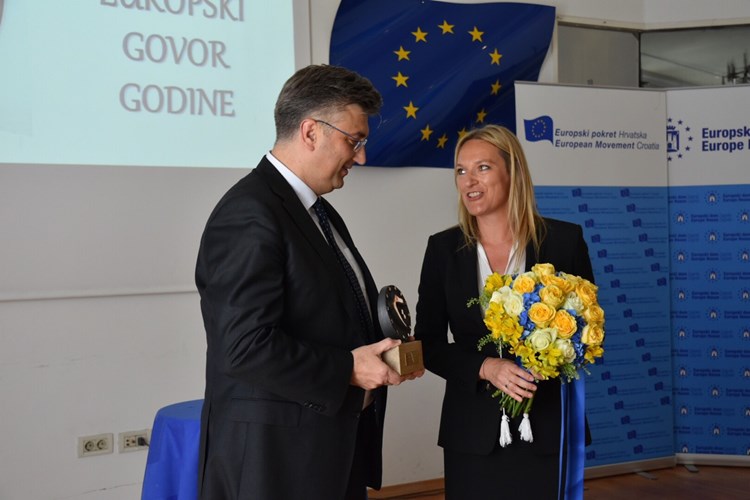


"It is important to know in the economic sense that in 2004, after falling to the lowest level in 1993 because of the war, we reached the level we were at in 1990. We mustn't forget that because that is the consequence of the war period and the cause of the pace of our economic growth," Plenkovic said recalling that Croatia's neighbours in central and eastern Europe joined the EU on 1 May 2004, while Croatia joined on 1 July 2013.
"And that is the difference, that is the gap that we have to close today so that we can catch up with our neighbours who weren't faced with that kind of situation and who implemented their political, democratic and above all, economic transition in peace and were given much greater funding in some other times and quickly caught up with Western Europe," Plenkovic said in Europe House after receiving an award for European speech of the year by the European Movement of Croatia.
Plenkovic received the award for his speech made in the European Parliament in Strasbourg on 6 February in which he presented his vision of Europe's future. The award is presented on Europe Day and represents the highest award by the European Movement, which is a member of the European Movement International.
Accepting the award, Plenkovic recalled the growing populism, anti-establishment parties and anti-European parties, not just in Croatia but in all EU member states and assessed that it is up to responsible parties to be a "shield" against those processes and to advocate values and political, economic and social solutions that will receive the majority support of voters and to clearly stand behind the European values.
"In that regard, we wish to continue structural reforms, strengthen the business and investment climate in Croatia, which will additionally boost growth, continue the policy of fiscal consolidation and resolve big issues, which were mostly inherited but which we still carry - from demographic revitalisation, the issue of blocked accounts to investment in the future, above all in education, so that young people have an opportunity like their peers across the EU," Plenkovic said.
Speaking about the advantages of EU membership, the prime minister recalled that Croatia will soon assume the chairmanship of the Council of Europe Committee of Ministers and in the first half of 2020 it will chair the European Union. "We are entering a phase of maturity where we are expected to show leadership and send proper messages and initiate real initiatives, always with the ambition to help our neighbours and take account of their European aspirations," he said.
Plenkovic made mention of the largest infrastructure project in the country, the Peljesac Bridge, and said that it was a "lasting monument of the first seven years of our membership of the EU."
"That is the best possible way to illustrate what Europe's added value is. There are a lot of examples like that," the prime minister said, referring to the LNG terminal and several other projects throughout the country.
"Therefore, firmly believing in the reasons for the creation of the European project - like peace, cooperation, economic development, resolving outstanding issues - I think that today we have an even greater responsibility so that our membership of the EU makes the lives of our citizens better every day," Plenkovic said.
"We stand behind these values. They are as much Croatian as they are European," Plenkovic concluded.
Accepting the award on Europe Day, the prime minister recalled that today we mark the 73rd anniversary of the victory over fascism, the day when Europe was liberated and the day when World War II ended.
Text: Hina